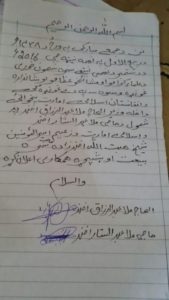The Taliban announced that the former interior minister Mullah Abdul Razaq Akhund as well as Mullah Abdul Sattar Akhund have sworn allegiance to its emir, Mullah Haibatullah. Razaq and Sattar are the latest influential jihadist leaders to reconcile with group.
Razaq and Sattar’s announced their “declaration of allegiance” to Mullah Haibatullah in a statement released on the Taliban’s Arabic-language version of Voice of Jihad. According to the Taliban, the two leaders “promised to do everything in their power efforts to serve the Islamic emirate.” A photograph of the statement (right) was also published.
Razaq was listed by the United Nations Security Council as a sanctioned member of the Taliban on Jan. 25, 2001, long before the US invasion of Afghanistan. At the time, he served as the “Minister of Interior Affairs and Chief of Kabul Police of the Taliban regime,” which put him in charge of directing Taliban atrocities in the capital, including the brutal public murders of women.
Additionally, Razaq was “a member of Taliban Supreme Council,” or Quetta Shura, “as at June 2008,” according to the UN. “He was a deputy to Mohammed Omar as at March 2010” and “has been involved in drug trafficking.”
Haibatullah took over the Taliban in May 2016 after his predecessor, Mullah Mansour, was killed by the US in a drone strike in Pakistan. Mansour’s appointment to lead the Taliban was controversial within the group as he was responsible for hiding Mullah Omar’s death for two years before being forced to disclose it. Several Taliban leaders and factions refused to swear allegiance to Mansour.
Haibatullah has succeeded in bringing many of the recalcitrant factions back into the fold, including Mullah Omar’s brother and son, the Mullah Dadullah Front and the Dadullah family, Anwar ul Haq Mujahid and the Tora Bora Military Front, and Mullah Baz Mohammad.
Haibatullah still faces a leadership challenge from Mullah Rasul, who commands a small breakaway Taliban group that calls itself the High Council of Afghanistan Islamic Emirate. Rasul’s faction has clashed with the established Taliban in the past, however there are indications that the two may eventually reconcile. The High Council of Afghanistan Islamic Emirate was weakened when Mullah Baz Mohammad, one of Rasul’s deputies, defected and swore allegiance to Haibatullah. The Islamic State also has a small presence in Afghanistan, however at this time it poses a minor threat to the Taliban, particularly in Nangarhar province, where it remains entrenched.
Are you a dedicated reader of FDD's Long War Journal? Has our research benefitted you or your team over the years? Support our independent reporting and analysis today by considering a one-time or monthly donation. Thanks for reading! You can make a tax-deductible donation here.









1 Comment
Savages. Drug peddlers. Rapists. Mullah (cough, cough) Omar was dead for years before they (ISI) even told anyone. Who cares who swears what to who in this charade. Who is the puppetmaster in Pakistan? That’s who we need to disable.